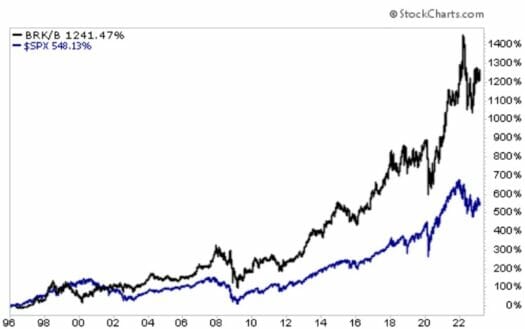Why Buffett Still Matters… Why Berkshire Is Still A “No-Brainer” Today…
 I talk a lot about the Oracle of Omaha in the pages of my premium newsletter, Capital Wealth Letter. And for good reason. Buffett’s personal net worth is reportedly $108 billion, according to Forbes. And as the most successful investor of his generation, he’s worth listening to.
I talk a lot about the Oracle of Omaha in the pages of my premium newsletter, Capital Wealth Letter. And for good reason. Buffett’s personal net worth is reportedly $108 billion, according to Forbes. And as the most successful investor of his generation, he’s worth listening to.
Personally, I’ve always been fascinated not by how much he’s worth, but by how he made his fortune…
 I’ve written about these topics extensively. In this piece, I discussed how Buffett looks for economic moats. In another article, I talked about how he’s used the insurance business to generate massive amounts of cash — which he can then invest. And here, I talked about Buffett’s unique personal qualities — and how they can make you a better investor.
I’ve written about these topics extensively. In this piece, I discussed how Buffett looks for economic moats. In another article, I talked about how he’s used the insurance business to generate massive amounts of cash — which he can then invest. And here, I talked about Buffett’s unique personal qualities — and how they can make you a better investor.
But don’t just take my word for it. Thankfully for us, he’s provided a blueprint, if you will — of exactly how he’s done it by way of his annual shareholder letters.
Everyone has access to these writings. You can access them all right here. They don’t cost a dime. They’ll tell you everything you need to know. Yet, despite all that, most people don’t follow his advice. They either think they have it figured out, or they simply don’t pay close enough attention.
If you haven’t already, I’d encourage you to check out his latest shareholder letter, released a couple of weeks ago.
Want to invest alongside Buffett? Well, there’s a way you can do that. Perhaps one of the single best things the average investor can do for their long-term wealth is to just simply buy shares of his firm, Berkshire Hathaway (NYSE: BRK-B).
I know it sounds simple – which is why a lot of people simply won’t do it. But that’s a mistake, because Berkshire provides investors with a great opportunity.
Why You Should Own Berkshire In Just About Any Market
Think about it… Investing alongside some of the world’s greatest investors typically requires an astronomical net worth. Hedge funds won’t even give you the time of day unless you have millions to give them.
But Buffett has made it easy for the rest of us. For more than 20 years the company was content with its highly priced, single class of stock – the “A” shares. That requires close to half-a-million dollars, and it will get you only one share.
But that all changed in 1996… You see, it was difficult for the ordinary investor to even get a nibble of Buffett’s world-class business. At the time it was trading around $30,000 per share. But in 1996, Buffett and the board of directors responded by issuing 517,500 shares of Class B shares.
The reasoning behind it was simple. First, Buffett wanted to provide investors the opportunity to invest alongside him without having to go through unit trusts, or mutual funds. He also didn’t want sneaky investment managers to form funds and market them as Berkshire replicas. As he told investors in his 1996 annual shareholder letter:
As I have told you before, we made this sale in response to the threatened creation of unit trusts that would have marketed themselves as Berkshire look-alikes. In the process, they would have used our past, and definitely non-repeatable, record to entice naïve small investors and would have charged these innocents high fees and commissions.
Retail investors who took advantage of the easier access to Buffett’s empire have done very well for themselves…

Surprisingly, many investors still aren’t aware that they can own shares of Buffett’s company for a fraction of the price. Either that, or they aren’t willing to.
I understand that Berkshire Hathaway isn’t a very “sexy” or “exciting” recommendation. But it’s what I like to call a “no-brainer” investment.
Take for example one of my absolute favorite industries to invest in – insurance. Buffett is a fan, too – in fact, it’s the float from Berkshire’s insurance holdings (like GEICO) that provide the firepower to make his picks.
Most people don’t give insurance companies a second look in their portfolio. But a well-run insurance company is like a cash machine.
This brings up a larger point – and I think it’s one of the main reasons why people don’t buy shares of Berkshire. A lot of investors think they need to buy speculative, risky investments to strike it rich in the markets. And don’t get me wrong, we do swing for the fences occasionally over at my premium newsletter, Capital Wealth Letter. These types of investments do have their place.
But like your mother probably told you more than once, you need to eat your vegetables before enjoying dessert. Besides, if you had bought shares of Berkshire’s new “B” shares in 1996 you likely wouldn’t be complaining with a 1,200% increase in your investment.
Closing Thoughts
Now before we go any further, let’s talk about the elephant in the room. I know it’s awkward, but the biggest worry folks have is what happens to Berkshire when Buffett — who is 92 years old — passes away.
When that day comes, the stock might dip. That’s also when you should probably buy more. Because in the long run the company will be just fine. Just look at how Apple’s stock has done, for example, since co-founder and CEO Steve Jobs died in October 2011 — it’s up more than 1,200%.
While we don’t know the details of the succession plan, we do know that Buffett has a solid management team in place. He makes a point of highlighting his team in every shareholder letter.
The point is, nobody knows what 2023 will bring us. And I’m certainly not saying Berkshire will deliver the same kinds of returns it has in the past. But those who are willing to stash some cash in this no-brainer investment can rest easy… You can feel confident knowing you’re investing alongside one of the world’s greatest investors in a pick that has plenty of potential upside and strong downside protection.
Berkshire has everything at its disposal to be a wonderful long-term investment and navigate whatever the future throws at us. It should likely continue to outpace the broader market, and it should be a core holding in just about any portfolio.
Editor’s Note: Like I said earlier, if the core of your portfolio is set, there’s nothing wrong with taking a big swing at something a little more exciting with a lot more upside…
That’s where my report of investment predictions for 2023 comes in. It’s full of research that challenges the conventional wisdom. And while we don’t have a crystal ball, many of our past predictions have come true, allowing investors the chance to rake in gains of 622%, 823%, and even 1,168%.
From the U.S. dollar to driverless trucks to breakthrough cancer treatments and more… If you’re looking for some “home-run” ideas for your portfolio, then I can’t think of a better place to start.
